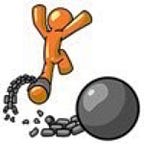Pillars of a Hacked High School Experience
How might teachers judge if a learning playlist should earn teens high school credit? Begin with these checks.
Does it develop personal connections?
Not all pathways and experiences will. Most should. Whether the new connection is someone at the local arts center, a peer across town or across the state, professional programmers, designers, marketing execs, or manufacturers; in general, the point of doing this is to meet more people than one teacher at the front of the classroom.
Others have talked of this:
- Students Aren’t Going To College To Learn, They’re Going To Network
- The invisible currency in education reform: social capital and the #WhoYouKnow series
Does it Allow Extended Focus and Engagement?
Typically, high school classes have about 36 minutes of teacher engagement, with perhaps as much homework, perhaps not. Teen’s get the day’s, night’s, or week’s work done and…that’s it. Wait for instructions from an adult.
It’s hard to develop a deep engagement with anything, much less a sense of confidence or perseverance, when working in such limited chunks.
‘Hacked School’ experiences should, whenever possible, include production artifact that allow extended work and commitment.
It Must Dramatically Expand Literacy/Vocabulary
Did this experience increase the number of conversations the teen can join? The number, scope, and depth of written materials she can read?
As much as anything, vocabulary differentiates a good, solid course from other experiences.
For example: A teen who has completed chemistry class has added a vast repertoire of words and concepts to their vocabulary. While they may forget that Calcium is abbreviated Ca, that it’s atomic number is 20, it’s in the 4th period of the table, and is the lightest alkaline; they will always recognize much of the vocabulary they pick up. From names of elements to chemical properties and processes, to laboratory equipment to chemical compositions, new words of all kinds will at least be recognizable. As they later venture into further learning, environments of work, and even happy-hour small-talk, they will know whence the conversation has turned and be prepared to form questions to learn more.
Coursework in the arts should do the same. It should be full of words that allow the learner not just to show off her sensorial creativity, but to express the tools, processes, and techniques of doing so. Arts classes should also help the learner to describe in words more of the world. This vocabulary requirement has nothing to do with producing good art; it simply ensures that the teen is progressing in the number and levels of adult conversations they can engage in.
Does it Demand Teens Produce or Earn Something?
This goes hand-in-hand with the requirements to develop personal connections and to require extended focus and engagement. It’s easy for adults to “grade” mass assignments like worksheets without really connecting with a teen. Helping them produce something meaningful challenges adults to a deeper engagement.
Does It Give Them A New Framework of Analysis?
Here we’re largely thinking of citizenship. High school government class tells us how government is set up at the federal, state, and local levels. There’s much more to being an informed citizen. Think contract law, cost-benefit, military force structure, the uncertainty principle, statistics; yin-yang, sine waves and bias errors; financial valuation, machine learning algorithms, moral foundations and natural law.
Does It Introduce & Connect Them to Future Paths of Learning?
There’s a world of learning out there. How do we expose teens to the nuanced highways into it?
Does It Excite Their Passion?
Sometimes teens just need a reason to get up and come to school in the morn. For some kids, the passion class may be the only thing that keeps them in school.
That’s a good start. Let’s commit to going further. Over time, the hacked high school should remake every class into passion-driven learning that happens to include mastery of concepts like cosines and
Does It Give Them Credentials for Employment?
A year of reading and writing poetry might expand vocabulary; it might by some [not me] be considered to offer a framework of analysis; we might point to the poems written as artifacts produced. Yet rare is the job that demands an amateur poet.
Dana Gioia was fond of saying “Give me poets as foremen”. While there’s truth to that, most modern jobs have other basic requirements. To become foreman, you need to first meet the requirements of an entry-level worker. You need to be ready to follow before you can start to lead.
It’s a challenging set of pillars. Few playlists for coursework will stand on all six.
Three will be a good start for a given new course. A course built on eight pillars might replace Algebra II.
Ed Jones is author of the forthcoming book Hacking High School: Making School Work for All Teens. He is bootstrapping A Statewide Laboratory for Student-Driven Learning, and looking to test a new High School OS.
